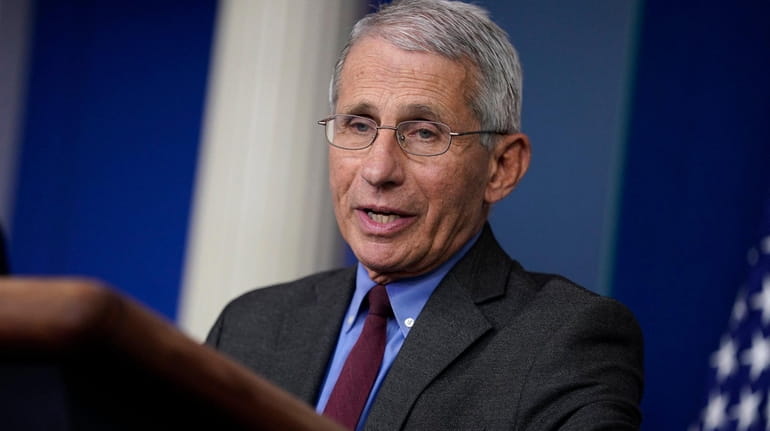Fauci predicts 'rolling re-entry' for different parts of the country

Anthony Fauci is a top official in the White House coronavirus taskforce. Credit: AP/Evan Vucci
A top member of the White House's coronavirus task force predicted Sunday that parts of the country could begin to reopen sometime in May, but stressed that a policy of "rolling re-entry" would mean different approaches across the United States.
Dr. Anthony Fauci, director of the National Institute of Allergy and Infectious Diseases, said Sunday on CNN's "State of the Union" that there would likely be a "gradual re-entry of some sort of normality, some rolling re-entry." He told CNN anchor Jake Tapper that he predicted a loosening of restrictions "could probably start, at least in some ways, maybe next month."
But he cautioned that the approaches to ending social distancing measures would vary depending on the severity of the coronavirus outbreak in particular communities.
Fauci told Tapper, "It is not going to be a light switch that we say, OK, it is now June, July or whatever, click, the light switch goes back on. It's going to be depending where you are in the country, the nature of the outbreak that you have already experienced," he said. "It is not an all or none. It's going to be something that you gradually and carefully, in different parts of the country in different ways, try to get back."
New Jersey Gov. Phil Murphy, a Democrat, said on "State of the Union" that relaxing social distancing guidelines on May 1 could be catastrophic. "I fear, if we open up too early, and we have not sufficiently made that health recovery and cracked the back of this virus, that we could be pouring gasoline on the fire, even inadvertently."
Asked by Tapper whether invoking stay-at-home measures in late February, rather than the middle of March, could have saved lives, Fauci acknowledged his point. "You could logically say, that if you had a process that was ongoing, and you started mitigation earlier, you could have saved lives."
But he said, "there was a lot of pushback about shutting things down back then.”
Dr. David Nabarro, World Health Organization special envoy, said on NBC's "Meet the Press" that quick action by nations to put communities on lockdown meant that the coronavirus is "not advancing quite as fast as we feared in some parts of the world."
He continued: "We're still very worried. And so we're still very much on high alert, and trying to support the countries that have got weaker health systems to really be able to get on top of it as best they can."
Nabarro said he wasn't sure the virus will "come in waves, in the way that influenza does. We think it's going to be a virus that stalks the human race for quite a long time to come until we can all have a vaccine that will protect us and that there will be small outbreaks that will emerge sporadically, and they will break through our defenses."
Dr. Stephen Hahn, commissioner of the Food and Drug Administration, said on ABC's "This Week" that the May 1 date to reopen the country is "a target. And obviously, we're hopeful about that target, but I think it's too early to be able to tell that."
Despite the growing death toll in New York, Fauci expressed a sign of optimism about the past week. "The New York metropolitan area had a very — a really terrible, terrible week of suffering and death.
"Nonetheless, the indications of that part of this machine that drives this outbreak is starting to level off, because on the same day that the New York metropolitan area had the highest number of deaths they had, when you look at the admissions, the hospitalizations, the intensive care and the need to intubate, that not only has flattened, it's starting to turn the corner."

